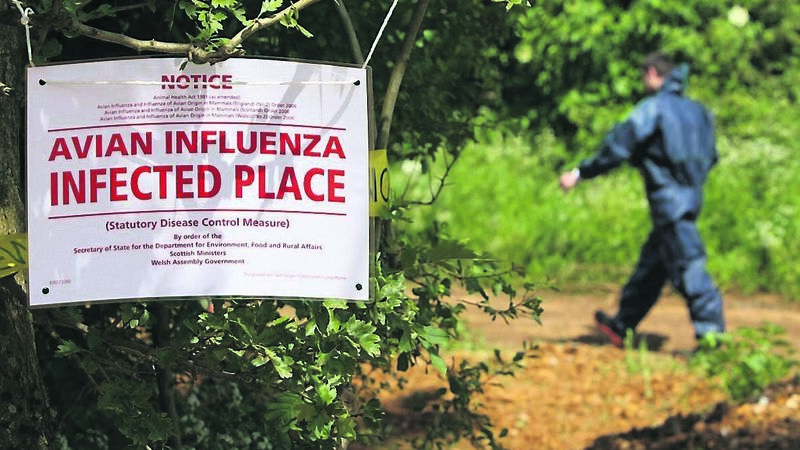Bird flu at The Lough - what are the risks to people?

The scene of a bird flu outbreak in the UK. The disease has spread from Asia since the early 2000s
Visitors to The Lough in Cork city are being asked to avoid contact with sick or dead birds at the sanctuary, after an outbreak of avian flu was confirmed.
Tests for the disease on a number of mallards found dead there proved conclusive for the low pathogenic avian influenza viruses, commonly referred to as bird flu.
A statement by Cork City Council said: “Bird flu or avian influenza is a viral disease which affects the respiratory, digestive and / or nervous system of many species of wild birds and poultry. It is highly contagious amongst birds and it is a notifiable animal disease.
“It can also pose a threat to people and other animals in certain circumstances, but these type of infections are rare. It is very unusual for people to catch bird flu.”
Fishing has been banned at The Lough due to the outbreak, while the bird feeder has also been decommissioned.
The area is undergoing intensive monitoring and surveillance to identify any further cases to ensure sick or dead animals in the area will be swiftly removed.
What is bird flu and what are the risks?
Bird flu, or avian influenza (A1), is a type of influenza that affects birds. Some types - known as low pathogenic avian influenza (LPAI) – produce very mild illness in birds. However, a small number of flu viruses produce severe illness in birds and are known as highly pathogenic avian influenza (HPAI).
When HPAI gets into a flock of birds it can kill the entire flock.
Since the early 2000s, HPAI bird flu has spread from Asia, to Europe, the Middle East and North Africa, mainly through bird migration. It can affect a very wide range of common wild birds who can then spread it to domestic poultry including chickens, turkeys and ducks.
Bird flu can also affect other animals including horses and cats, but rarely dogs.
Winter is the time of highest risk for bird flu in Ireland.
HPAI bird flu was first identified in Ireland in November, 2021, and numbers in Europe have been increasing since, posing an ongoing threat to Ireland’s domestic poultry flocks.
A single case of bird flu can mean that the entire flock on the poultry farm has to be slaughtered, along with other measures to prevent it spreading to other farms.
Can people catch bird flu?
The Health Protection Surveillance Centre (HPSC) report that bird flu is not easily spread from birds to people or between people.
Spread of bird flu from birds to people requires very close contact with live infected birds or their droppings. Symptoms include: fever, flu-like symptoms including cough, runny nose, sore throat, and shortness of breath. Other symptoms include diarrhoea which may present before the flu-like illness, stomach pain, vomiting or headache.
The type of bird flu currently found in Asia can produce serious disease. In the 800 human cases in Asia, since 2004, half of them have died.
However, the type of bird flu that is present in Europe at the moment, although very dangerous to birds, has produced only mild symptoms in people in Europe.
The big threat to people from bird flu is that flu viruses are always changing.
At the moment, bird flu does not spread easily between people. However, the HPSC report that that could change.
One factor is if a person comes into contact with bird flu when they are already sick with seasonal flu. This could allow the viruses to mix and change to a type that spreads easily from person-to-person. If this happens, it could start a flu pandemic.
At the moment, bird flu does not present a big risk to the general public in Ireland. The number of cases of bird flu is not high and it is very hard for people to catch.
The HPSC state that the risk of bird flu to the general public is therefore extremely low, with the risk in the general outside environment to adults and children at “almost nil”.
Nor is there a risk of catching bird flu from eating properly cooked poultry or eggs. Irish poultry and eggs when properly cooked are perfectly safe to eat.
How can I avoid getting bird flu?
The best way to protect yourself against bird flu is to avoid contact with birds.
When birds come in contact with bird flu, they become extremely sick very quickly, and nearly all will die.
In the meantime, it is important to:
Never handle birds that are sick or found dead. Never pick up or touch sick, dying or dead poultry or wild birds and keep any pets away from them. Dogs should be kept on a lead when walking in areas where there are sick or dead wild birds.
Avoid all contact with any surfaces contaminated with bird droppings. Avoid contact with bird feathers and other bird waste and maintain good personal hand hygiene.
The public can and should report any sick or dead birds to the city council, or to the Department of Agriculture, Food and the Marine via the local regional veterinary office by using the Avian Check Wild Bird App aviancheck.apps.services.agriculture.gov.ie/ or by contacting the National Disease Emergency Hotline 01 492 8026 (outside office hours).







 App?
App?




